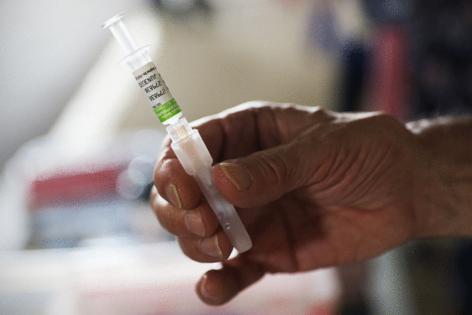Flu season peak is still to come this year. Is it too late to get your flu shot?
Published in News & Features
The kids are in school, Halloween decorations are coming down to make way for the holiday season and the fall crisp air floods your lungs each morning.
But soon, that deep breath may get harder as another fall staple comes to your area — flu season.
While flu shot campaigns and initiatives start around the end of the summer, the peak season for flu is still weeks away.
And if you haven’t gotten your flu shot for this year you may be wondering if it’s now too late.
Here’s what you need to know.
When is peak flu season?
The flu, caused by the influenza virus, can technically spread the entire year, but there are periods of time when there are more cases and more serious infections, according to the Centers for Disease Control and Prevention.
Flu activity tends to pick up in the fall, but the official peak “flu season” runs from December to February, according to the CDC.
In data from the 1982-1983 flu season all the way to the 2023-2024 flu season, 18 years have had their peak in the month of February. Only one year peaked in October, one year peaked in November, nine years peaked in December and six years peaked in January.
After February, six years peaked in March, one year peaked in April and there has never been a flu peak recorded in May through September since 1982, CDC data shows.
While each year may peak around the same time, it is not the same version of the influenza virus every year, meaning a flu vaccine received in October 2024 may not be effective by the time October 2025 rolls around.
This is why health experts recommend receiving a flu vaccine every year for the most up-to-date coverage.
Who should get a flu shot?
The CDC recommends everyone over the age of 6 months get an annual flu shot.
Getting a vaccine does not guarantee that you will not contract the influenza virus, but it will greatly decrease the severity of the infection, including reducing symptoms, avoiding trips to the doctor’s office and shortening the days needed to take off work or school, the CDC says.
For people at higher risk for respiratory infections, the shot can also help avoid a hospitalization or even death.
There are multiple kinds of flu shots, but any of them are considered appropriate for people between the ages of 6 months and 65, the CDC says.
For those over the age of 65, your doctor may recommend a Fluzone High-Dose inactivated flu vaccine, a Flublok recombinant flu vaccine or a Fluad adjuvanted inactivated flu vaccine.
Those between the ages of 6 months and 49 are also eligible for the flu vaccine that is administered through a nasal spray instead of a shot, the CDC says.
When should you get a flu shot?
Health officials recommend getting a flu shot or the nasal spray at the beginning of the flu season, typically in September or October, according to the CDC.
Ideally, the agency says, everyone would have their flu shot by the end of October.
Protection provided by the vaccine can wane over time, so those older than 65 and people who are pregnant should not get their shot too early so they remain protected the entire season, the CDC says.
If you have a child who requires more than one shot, as recommended by a healthcare provider, one shot given at the beginning of the season and a second shot four weeks later may also be appropriate.
It’s already November. Is it too late for a flu shot?
No. If you haven’t gotten a flu shot for this season, it is not too late. The virus continues to circulate year-round and with the peak season yet to come, a shot now is still protective.
Local pharmacies, grocery store clinics, health departments and doctors’ offices are offering flu shots now. Flu shots are free through most insurance.
©2025 Miami Herald. Visit at miamiherald.com. Distributed by Tribune Content Agency, LLC.







Comments